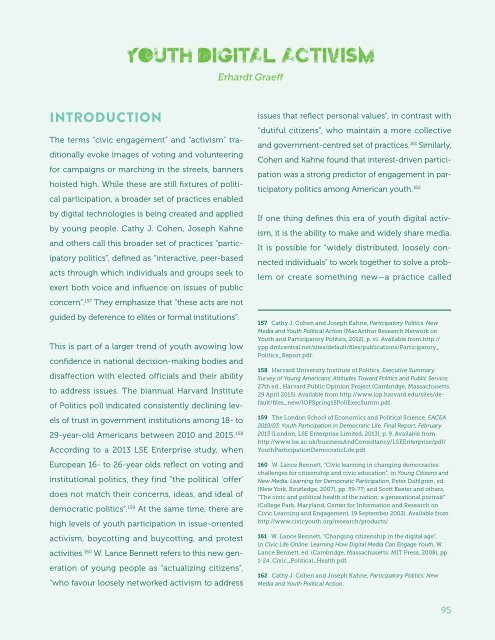YOUTH CIVIC
JieguI2U
JieguI2U
Create successful ePaper yourself
Turn your PDF publications into a flip-book with our unique Google optimized e-Paper software.
<strong>YOUTH</strong> DIGITAL ACTIVISM<br />
Erhardt Graeff<br />
INTRODUCTION<br />
The terms “civic engagement” and “activism” traditionally<br />
evoke images of voting and volunteering<br />
for campaigns or marching in the streets, banners<br />
hoisted high. While these are still fixtures of political<br />
participation, a broader set of practices enabled<br />
by digital technologies is being created and applied<br />
by young people. Cathy J. Cohen, Joseph Kahne<br />
and others call this broader set of practices “participatory<br />
politics”, defined as “interactive, peer-based<br />
acts through which individuals and groups seek to<br />
exert both voice and influence on issues of public<br />
concern”. 157 They emphasize that “these acts are not<br />
guided by deference to elites or formal institutions”.<br />
This is part of a larger trend of youth avowing low<br />
confidence in national decision-making bodies and<br />
disaffection with elected officials and their ability<br />
to address issues. The biannual Harvard Institute<br />
of Politics poll indicated consistently declining levels<br />
of trust in government institutions among 18- to<br />
29-year-old Americans between 2010 and 2015. 158<br />
According to a 2013 LSE Enterprise study, when<br />
European 16- to 26-year olds reflect on voting and<br />
institutional politics, they find “the political ‘offer’<br />
does not match their concerns, ideas, and ideal of<br />
democratic politics”. 159 At the same time, there are<br />
high levels of youth participation in issue-oriented<br />
activism, boycotting and buycotting, and protest<br />
activities. 160 W. Lance Bennett refers to this new generation<br />
of young people as “actualizing citizens”,<br />
“who favour loosely networked activism to address<br />
issues that reflect personal values”, in contrast with<br />
“dutiful citizens”, who maintain a more collective<br />
and government-centred set of practices. 161 Similarly,<br />
Cohen and Kahne found that interest-driven participation<br />
was a strong predictor of engagement in participatory<br />
politics among American youth. 162<br />
If one thing defines this era of youth digital activism,<br />
it is the ability to make and widely share media.<br />
It is possible for “widely distributed, loosely connected<br />
individuals” to work together to solve a problem<br />
or create something new—a practice called<br />
157 Cathy J. Cohen and Joseph Kahne, Participatory Politics: New<br />
Media and Youth Political Action (MacArthur Research Network on<br />
Youth and Participatory Politics, 2012), p. vi. Available from http://<br />
ypp.dmlcentral.net/sites/default/files/publications/Participatory_<br />
Politics_Report.pdf.<br />
158 Harvard University Institute of Politics, Executive Summary:<br />
Survey of Young Americans’ Attitudes Toward Politics and Public Service,<br />
27th ed., Harvard Public Opinion Project (Cambridge, Massachusetts,<br />
29 April 2015). Available from http://www.iop.harvard.edu/sites/default/files_new/IOPSpring15PollExecSumm.pdf.<br />
159 The London School of Economics and Political Science, EACEA<br />
2010/03: Youth Participation in Democratic Life, Final Report, February<br />
2013 (London, LSE Enterprise Limited, 2013), p. 9. Available from<br />
http://www.lse.ac.uk/businessAndConsultancy/LSEEnterprise/pdf/<br />
YouthParticipationDemocraticLife.pdf.<br />
160 W. Lance Bennett, “Civic learning in changing democracies:<br />
challenges for citizenship and civic education”, in Young Citizens and<br />
New Media: Learning for Democratic Participation, Peter Dahlgren, ed.<br />
(New York, Routledge, 2007), pp. 59-77; and Scott Keeter and others,<br />
“The civic and political health of the nation: a generational portrait”<br />
(College Park, Maryland, Center for Information and Research on<br />
Civic Learning and Engagement, 19 September 2002). Available from<br />
http://www.civicyouth.org/research/products/<br />
161 W. Lance Bennett, “Changing citizenship in the digital age”,<br />
in Civic Life Online: Learning How Digital Media Can Engage Youth, W.<br />
Lance Bennett, ed. (Cambridge, Massachusetts: MIT Press, 2008), pp.<br />
1-24. Civic_Political_Health.pdf.<br />
162 Cathy J. Cohen and Joseph Kahne, Participatory Politics: New<br />
Media and Youth Political Action.<br />
95


